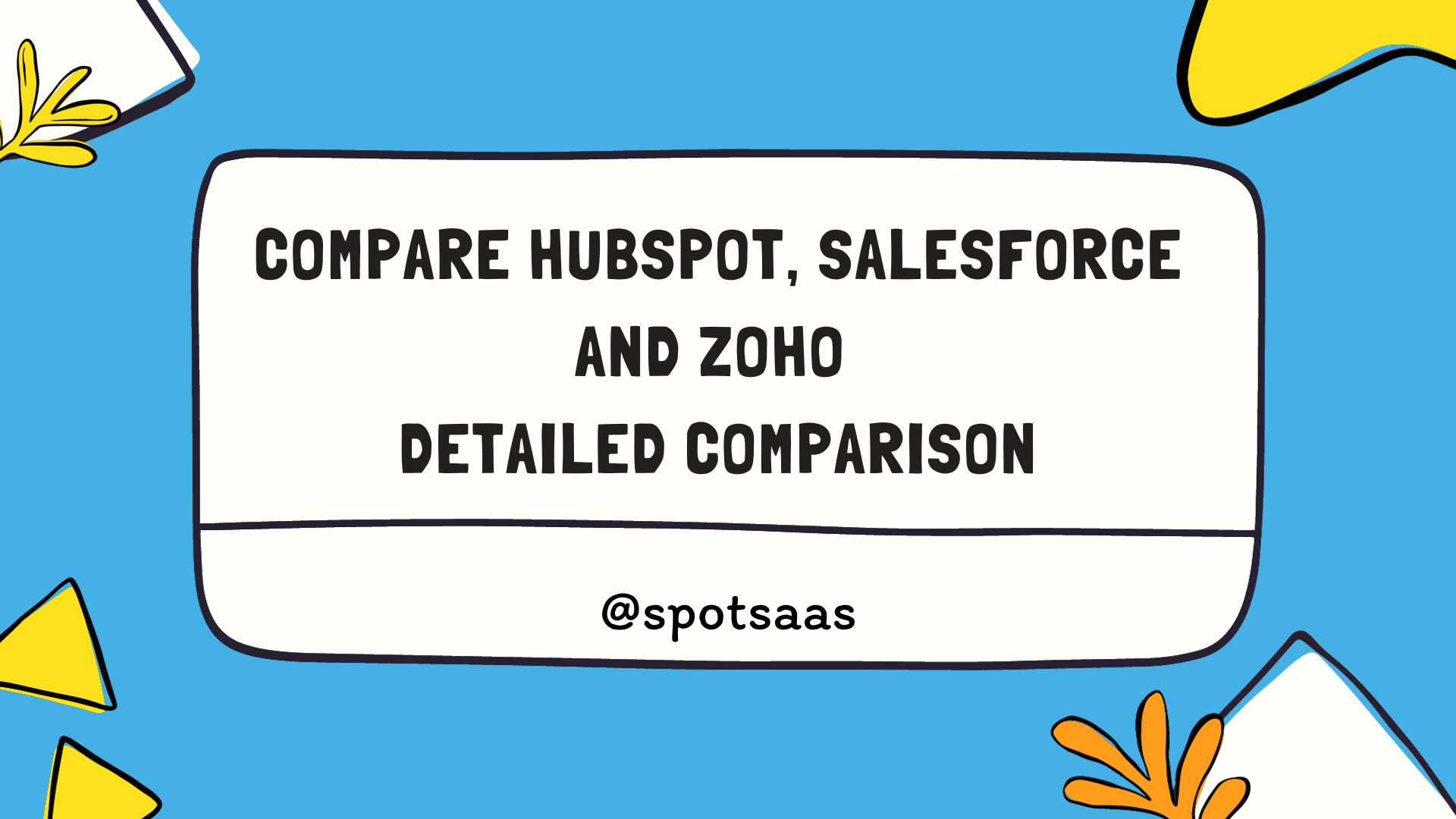Managing client relationships can be challenging. Web-based CRM – a CRM that simplifies and optimizes customer interactions for businesses of all sizes on the web
This article will demystify what a web-based CRM is, explore its pros and cons, and present the top 10 best options to consider. Ready to transform your customer relationship strategy?
Key Takeaways
- A web-based CRM is an online software tool that helps businesses manage their customer relationships and interactions.
- It offers benefits such as cost-effectiveness, easy installation, user-friendly interfaces, integration capabilities, and scalability.
- The top 10 web-based CRM options include Salesforce, Hubspot, Zendesk, Microsoft Dynamics, Freshsales, Zoho CRM, Pipedrive, Apptivo, Agile CRM and Nimble.
- Pros of using web-based CRM: it is affordable compared to traditional systems; it can be easily installed on any device with internet access; it has a user-friendly interface; it integrates well with other tools; and it can grow with the business’s needs.
- Cons of using web-based CRM: limited offline access and potential security concerns.
Overview of Web-Based CRM Software

Web-based CRM software allows businesses to manage customer relationships and communication online, offering extensive functionality and customization options.
Difference between web-based and traditional CRM
Web-based CRM and traditional CRM are not the same. Traditional CRM is software put on a computer. It works only on that device. But web-based CRM goes online. You can use it anywhere with an internet link-up.
Web-based CRM has many good points tied to it. This includes being able to change as your company gets bigger, giving useful facts about your clients and working well with other tools you may be using at work.
Some might look old but they still do a good job helping manage customers better than before.
Benefits of using a web-based CRM
Web-Based CRM helps businesses in many ways. First, it lets firms better manage their client talks and data. The tool also aids all kinds of businesses to boost their work. Plus, they can change the software as they wish. It can grow with the firm’s needs which adds value. Web-based CRM links well with other tools for smooth work. It gives important data about clients’ actions for the business to study. But, some may look old due to their start as contact management tools. Lastly, prices can be different for each software and can go up to $150 per user every month for big solutions.
Top 10 Web-Based CRM Software
Here are the top 10 web-based CRM software options available:
| CRM Software | Description |
|---|---|
| Salesforce | Known for its robust features and scalability, Salesforce is a popular choice among businesses of all sizes. |
| Hubspot | This user-friendly CRM offers a wide range of marketing automation tools to help businesses streamline their sales and marketing efforts. |
| Zendesk | With its focus on customer support, Zendesk provides a comprehensive solution for managing customer interactions and resolving issues. |
| Microsoft Dynamics | As part of the Microsoft suite of products, Dynamics offers seamless integration with other Microsoft applications, making it ideal for businesses already using these tools. |
| Freshsales | With its intuitive interface and affordable pricing plans, Freshsales is a great option for small to medium-sized businesses looking for an easy-to-use CRM solution. |
| Zoho CRM | Zoho offers a full suite of business applications, including their web-based CRM that provides extensive customization options and advanced reporting capabilities. |
| Pipedrive | Designed specifically for sales teams,. |
Salesforce
Salesforce is a top name in web-based CRM. Businesses big and small use Salesforce for better operations. It suits their needs well because it has many helpful features. For example, it helps manage customer information online with ease.
Salesforce grows as your business grows, making it a smart choice for many companies. Plus, it works well with other software you might already use. However, some people find its look a bit old-fashioned since Salesforce started as a contact tool only.
The cost of using Salesforce can be high too – sometimes up to $150 per user every month.
Hubspot
Hubspot is a popular web-based CRM software that helps businesses manage their customer relationships. With its user-friendly interface and extensive features, Hubspot enables companies to effectively track sales pipelines, generate reports and analytics, and execute marketing campaigns.
It also offers integration capabilities with other tools and software to streamline processes. While Hubspot has many advantages, some users have mentioned that its pricing can be on the higher side compared to other options.
Overall, businesses looking for a comprehensive CRM solution may consider Hubspot as one of the top choices in the market.
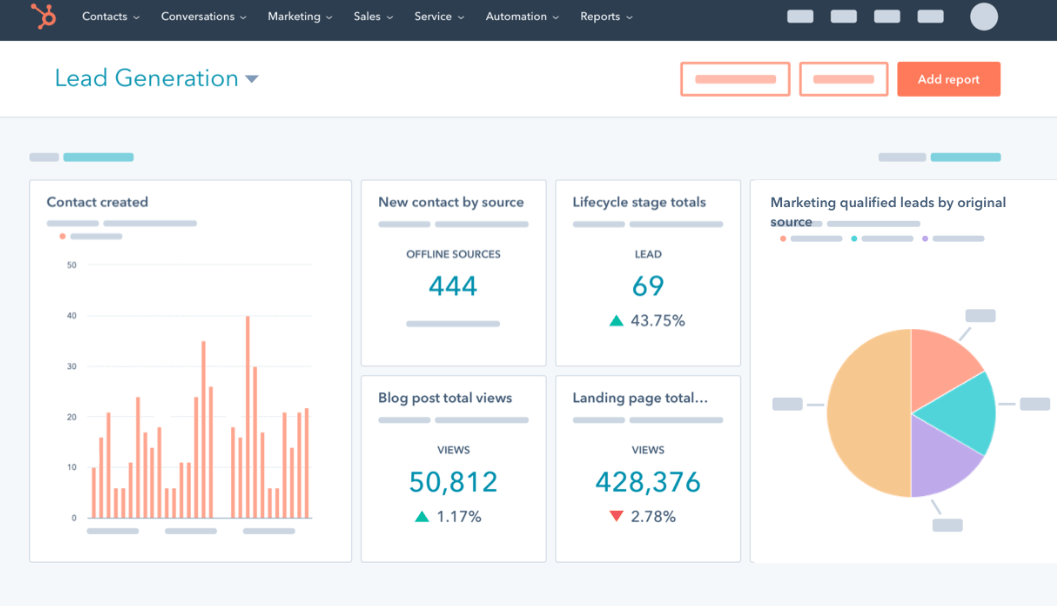
Zendesk
Zendesk is a web-based CRM software that helps businesses manage their customer relationships and support interactions. It offers features like ticketing, live chat, and self-service portals to improve customer satisfaction.
Zendesk allows companies to track customer inquiries and provide timely responses, ensuring efficient customer support. With its user-friendly interface and customization options, it can be easily tailored to suit different business needs.
Additionally, Zendesk integrates with other tools, such as email platforms and social media channels, making it easier for businesses to centralize their customer communication. Overall, Zendesk is a popular choice for businesses looking for effective customer relationship management solutions.
Microsoft Dynamics
Microsoft Dynamics is a popular web-based CRM software that offers a range of features for businesses. It provides tools for sales pipeline management, reporting and analytics, and marketing capabilities.
With Microsoft Dynamics, businesses can track customer needs, preferences, and behaviors to better understand their target audience. The software also integrates with other CRM systems and tools, allowing for seamless data exchange and collaboration.
While pricing may vary, Microsoft Dynamics is known for its user-friendly interface and scalability options, making it suitable for businesses of all sizes.
Freshsales
Freshsales is a web-based CRM software that helps businesses manage and organize their client information and communication online. It offers features such as sales pipeline management, reporting and analytics, and marketing capabilities.
Freshsales is known for its user-friendly interface and easy installation process. It also integrates well with other software tools, making it more efficient for businesses to use.
While it may not have the most modern look compared to other options, Freshsales provides cost-effective solutions for businesses of all sizes. With its scalability and customization options, Freshsales can adapt to the changing needs of a growing business.
Zoho CRM
Zoho CRM is a web-based customer relationship management software that helps businesses manage their customer information and communication online. It offers features like sales pipeline management, reporting and analytics, and marketing capabilities.
Zoho CRM is known for its user-friendly interface and easy installation process. It also has integration capabilities with other software tools, making it convenient for businesses to use.
With Zoho CRM, businesses can effectively track customer needs, preferences, and behaviors to improve their relationships with customers.
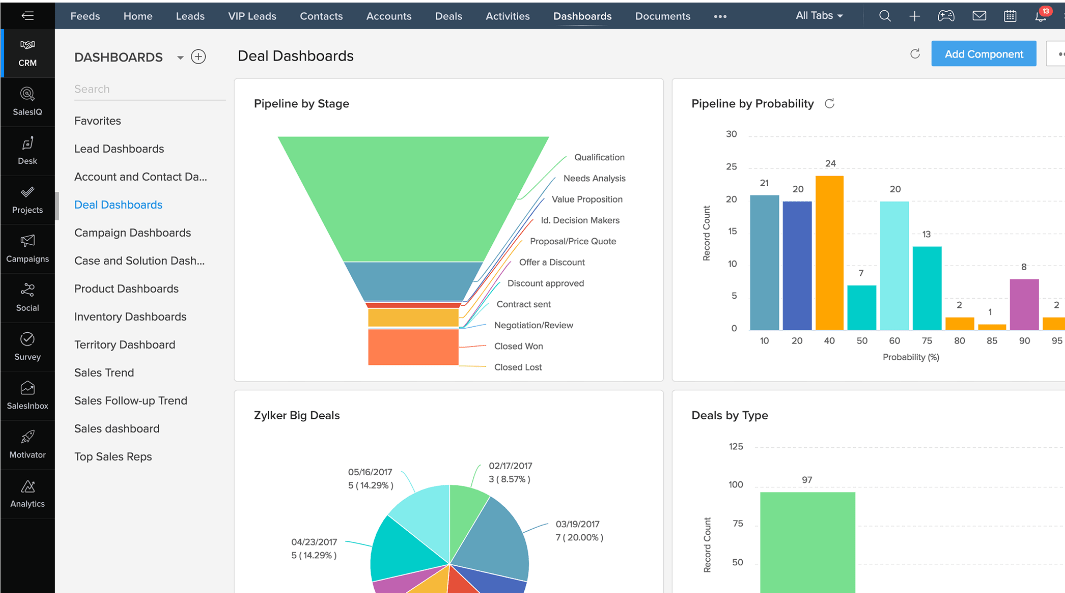
Pipedrive
Pipedrive is a web-based CRM software that focuses on sales pipeline management. It helps businesses keep track of their leads, deals, and contacts in one central place. With Pipedrive, you can easily visualize your sales pipeline and see where each deal stands.
This allows you to prioritize your efforts and focus on closing more deals.
One key feature of Pipedrive is its reporting and analytics capabilities. It provides valuable insights into your sales performance, allowing you to identify areas for improvement and make data-driven decisions.
Additionally, Pipedrive offers marketing capabilities, enabling you to segment your audience and target them with personalized campaigns.
Pipedrive is known for its user-friendly interface and intuitive design. It is easy to navigate and requires minimal training to get started. Furthermore, it integrates seamlessly with other tools and software such as email clients, calendars, and project management platforms.
Apptivo
Apptivo is a web-based CRM software that offers a wide range of features to help businesses manage their customer relationships effectively. It provides sales pipeline management, reporting and analytics, and marketing capabilities to streamline operations.
With its cloud-based solutions, businesses can access their data anytime, anywhere. Apptivo also offers integration capabilities with other software and tools, making it easier for businesses to stay organized and efficient.
While the user interface may not be as modern as some other options, Apptivo’s cost-effectiveness and easy installation make it a popular choice for many businesses.
Agile CRM
Agile CRM is a web-based CRM software that helps businesses manage their customer relationships effectively. It offers various features such as sales pipeline management, reporting and analytics, and marketing capabilities.
With Agile CRM, businesses can track customer needs, preferences, and behaviors to provide better service. This CRM tool also integrates with other software and tools used by a business, making it easier to streamline operations.
While pricing may vary, Agile CRM offers an affordable solution for businesses of all sizes. Overall, Agile CRM is a user-friendly and customizable option for managing customer relationships online.
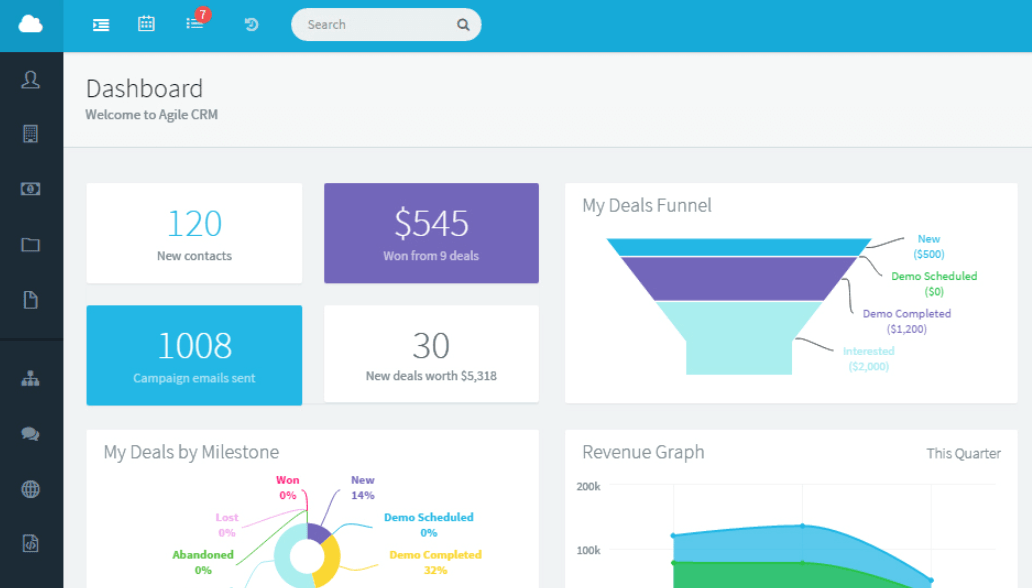
Nimble
Nimble is a web-based CRM software that helps businesses manage their customer relationships effectively. With Nimble, you can easily organize and access all your client contact information in one place.
This includes details like names, emails, phone numbers, and social media profiles. Nimble also offers features like sales pipeline management and reporting analytics, allowing you to track your sales progress and analyze data for better decision-making.
It integrates well with other tools you may already be using, making it convenient to streamline your operations. Additionally, Nimble provides marketing capabilities to help you engage with customers through targeted campaigns based on their preferences and behaviors.
Pros and Cons of Web-Based CRM
Web-based CRM systems offer cost-effective solutions, easy installation, user-friendly interfaces, integration capabilities, and scalability. However, they may have limited offline access and potential security concerns.
Read on to discover the pros and cons of web-based CRM software!
Cost-effective
Web-based CRM software is a cost-effective solution for businesses of all sizes. Compared to traditional CRM systems, web-based CRM eliminates the need for expensive hardware and infrastructure.
With web-based CRM, businesses can access their customer data and manage relationships from any device with an internet connection. This means they don’t have to invest in on-premise servers or IT staff to maintain the system.
Additionally, many web-based CRM providers offer flexible pricing options, allowing businesses to choose a plan that fits their budget and scale up or down as needed. By opting for a cost-effective web-based CRM solution, businesses can save money while still enjoying the benefits of effective customer relationship management.
Easy installation
Web-based CRM software offers easy installation, eliminating the need for complex setups or IT expertise. Businesses can get started quickly by signing up online and accessing the CRM system through a web browser.
With no need to install software on individual computers, it saves time and resources while providing instant access to customer data and features. Easy installation ensures that businesses can implement a web-based CRM solution without any hassle, allowing them to focus on improving customer relationships and growing their business.
User-friendly
Web-based CRM software is designed to be user-friendly, making it easy for businesses to navigate and utilize its features. With a simple interface and intuitive design, users can quickly learn how to input and access customer information, track sales activities, and generate reports.
This usability helps save time and reduces the need for extensive training or technical support. Businesses can focus on their customer relationships instead of struggling with complex software.
Whether you’re a small business owner or part of a larger organization, using a user-friendly web-based CRM system can make managing your customer interactions more efficient and effective.
Integration capabilities
Web-based CRM software offers powerful integration capabilities, allowing businesses to connect their CRM system with other tools and software they use. This means that data can be shared seamlessly between different platforms, saving time and improving efficiency.
For example, a web-based CRM can integrate with email marketing software, enabling businesses to send targeted emails based on customer interactions and preferences. It can also integrate with social media platforms, providing real-time updates and insights about customers’ online activities.
Furthermore, web-based CRM systems often have APIs (Application Programming Interfaces), making it easier for businesses to develop custom integrations with their existing systems.
Scalability
Scalability is a key advantage of web-based CRM software. It means that the software can easily grow and adapt as your business expands. Whether you have a small team or a large enterprise, web-based CRM can handle your increasing customer data and interactions without any hassle.
This flexibility allows you to add more users, features, or modules as needed to support your growing business needs. So, no matter how big or fast-paced your company becomes, a web-based CRM system can scale up with you seamlessly.
Which CRM Software is Best?
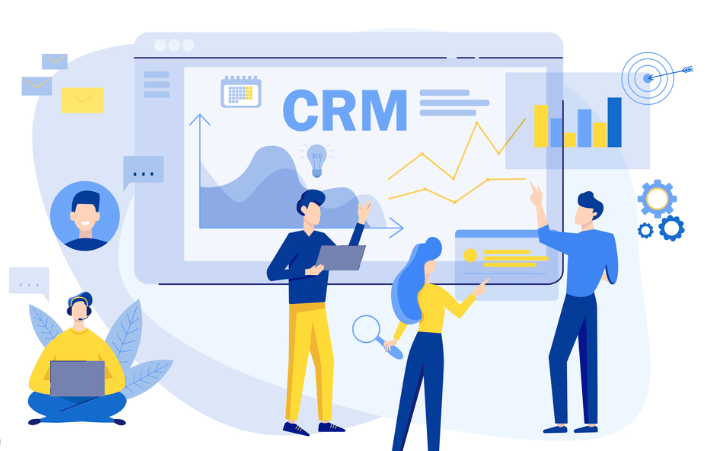
When it comes to choosing the best CRM software for your business, consider factors such as your specific needs, budget, and integration capabilities. Read on to find out which web-based CRM solution may be the perfect fit for you.
Factors to consider when choosing a CRM
To choose the right CRM for your business, consider these factors:
| Factor | Description |
|---|---|
| Business Needs | Identify your specific requirements and goals for implementing a CRM system. Consider areas like sales management, customer support, or marketing features. |
| Scalability | Ensure that the CRM software can accommodate your business’s growth and handle increased data and user volumes. |
| User-friendliness | Look for a CRM with an intuitive interface that is easy to navigate and use. User adoption is crucial for successful implementation. |
| Integration Capabilities | Check if the CRM can integrate with other tools, such as email marketing or accounting software, to streamline your processes and avoid data silos. |
| Customization Options | Evaluate whether the CRM offers flexibility to customize fields, workflows, and reports to match your unique business requirements. |
| Mobile Accessibility | Determine if the CRM has mobile apps or responsive web design to allow users to access information on the go. |
| Customer Support | Research the level of support provided by the CRM vendor, including availability, response time, and resources available for troubleshooting or training. |
| Data Security | Ensure that the CRM system offers robust security measures to protect sensitive customer information from unauthorized access or breaches. |
| Pricing Structure | Evaluate pricing models to find a solution that fits within your budget while providing necessary features and scalability options. |
| User Reviews | Read reviews from other businesses in similar industries to gather insights into real-world experiences and potential limitations of different CRM options. |
Best CRM for different business needs
- Salesforce CRM is a popular choice for businesses of all sizes, offering extensive customization options and integration capabilities.
- Zoho CRM is known for its user-friendly interface and affordability, making it a great option for small businesses.
- Microsoft Dynamics CRM is ideal for larger enterprises that require advanced features and seamless integration with other Microsoft products.
- Hubspot CRM offers a free version that includes robust marketing automation features, making it a good fit for companies focused on inbound marketing.
- Freshsales is known for its intuitive design and AI-powered lead scoring, making it suitable for sales teams looking to streamline their processes.
- Pipedrive focuses on visual sales pipeline management, making it a great choice for organizations that prioritize sales tracking and forecasting.
- Agile CRM provides comprehensive marketing automation features along with built-in telephony capabilities, catering to businesses that need both sales and marketing tools in one platform.
- Zendesk offers web-based customer support tools alongside its CRM features, making it an excellent choice for businesses in need of integrated customer service solutions.
- Apptivo provides a range of modules beyond traditional CRM functionalities including project management and invoicing, appealing to businesses looking for an all-in-one business management solution.
- Nimble CRM combines social media integrations with traditional contact management features, catering to businesses that value social selling and relationship-building.
[IMPORTANT FACTS]:
- It is a tool that helps businesses of all sizes improve their operations and better manage their customer relationships.
- One of the advantages of web-based CRM is its scalability, meaning it can easily grow and adapt to the changing needs of a business as it expands.
- Web-based CRM also provides a robust ecosystem, integrating with other software and tools that a business may already be using, making it more efficient and streamlined.
Conclusion
In conclusion, a web-based CRM is an online tool that helps businesses manage their customer relationships. It offers many benefits, such as scalability and integration capabilities.
While there are many options available, the best web-based CRM depends on the specific needs of each business. Understanding the pros and cons can help make an informed decision.
Frequently Asked Questions
What is a web-based CRM?
A web-based CRM (Customer Relationship Management) is a software application that helps businesses manage customer interactions, sales, and marketing activities through an internet browser.
How does a web-based CRM differ from other types of CRMs?
Unlike traditional CRMs that require installation on individual computers or servers, web-based CRMs are accessed through the internet using a browser. This allows for remote access, easier collaboration, and automatic updates without the need for manual installations.
What are the benefits of using a web-based CRM?
Some benefits of using a web-based CRM include accessibility from anywhere with an internet connection, real-time data syncing across devices, easy scalability to accommodate growing business needs, and lower upfront costs compared to on-premises solutions.
Are there any disadvantages to using a web-based CRM?
One potential disadvantage is reliance on internet connectivity for accessing and updating data. Additionally, some businesses may have security concerns about storing sensitive customer information in the cloud unless proper security measures are implemented.
Can you provide examples of popular web-based CRMs along with their pros and cons?
While this article discusses the 10 best web-based CRMs with their pros and cons in detail [hyperlink provided], some popular options include Salesforce, HubSpot CRM, Copper Prospector360, Salesflare, ZohoCRM, Freshsales, Pipedrive, Nimbleand, AgileCRM



